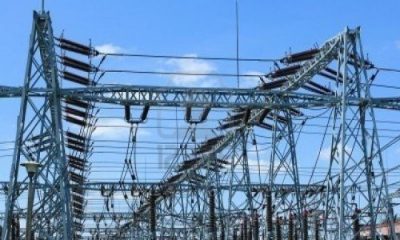Business
Main reasons Nigeria is suffering from Shortage of electricity supply – Lamu Audu reveals

Managing Director of Mainstream Energy Solutions, Mr Lamu Audu, has dismissed claims by the Transmission Company of Nigeria, TCN, that low water level was partially responsible for the current gross inadequate power supply in the country. He told journalists in Abuja that the issue of low water level did not arise, because, indeed, the level of water in the nation’s two main electricity generating dams in Kainji and Jebba were still rising, due to the black flood from Lake Chad. He said: “For anybody to mention water level is unacceptable. It is not true. The issue of water does not arise.”
According to Audu, of the total generation on the grid of 2,929 megawatts, as at Monday morning, Mainstream operators of both Kainji and Jebba Hydro Power plants contributed about 700megawatts and adding that Shiroro hydro power also had about 300 megawatts. He said the electricity industry was facing grave challenges that needed to be urgently addressed, especially to ensure the evacuation of all the power generated by his plants and that of others. He revealed that the industry had suffered three system collapses since the beginning of the year and that until the current crisis, occasioned mainly by gas pipelines vandalism, electricity generation frequency was too high and damaging plants. “There has been three-system collapse this year alone; two full collapse and one partial within the same month and this is what is causing all these fluctuations. Part of the problem is that when this system collapse happens, it affects our machines and now Jeba is suffering. “We have been having up to this week, high frequency which is as a result of somebody not using the power they are having, that is the only explanation. So, most of these high frequencies cause this system collapse.”
Electricity generated not being utilised. Audu said that it was ironical that power generation companies such as Mainstream were suffering losses due to unutilized power, while Nigerians have no power to run their businesses and for domestic uses. He said: “Our system is feeling it. The problem with generation of electricity is that electrical energy cannot be stored. You use as produced. So, these machines monitor that what it tries to put on the grid is actually utilized, if it is not, the frequency will shoot up and the machine will see it and then begins to de-load and if the machine is not designed to de-load on its own, it will trip to protect itself from the high frequency. “And by the time our machines trip, so many sequence of events happen within that machine and it causes a lot of wear and tear and with the aged machines that we have and by the time you go through one, two, three system collapse, the damage is much.” The Mainstream boss challenged the TCN to tell Nigerians why there have been consistent high frequency of above 50, with a record of 51.84 as at Monday morning. He said: “I think TCN should answer because they are the ones taking the energy from us and giving to the DISCOs but if the DISCOs are not utilizing it, they will know better than anybody else. “The DISCOs can deny but TCN should have the records to tell us what is happening to the energy that we are generating. Simple question: why has the frequency been high. Even from the system collapse, it shows from the broadcast 51.48 instead of 50 which means that someone is not taking the power we are producing. “It has been observed recently that the frequency has been on the high side, why? They should tell Nigerians why? Because if you ask the DISCO man, he will deny it, he will tell you there is no generation.”
Business
Nigeria’s Inflation Drops to 15.10% as NBS Reports Deflationary Trend

Nigeria’s headline inflation rate declined to 15.10 per cent in January 2026, marking a significant drop from 27.61 per cent recorded in January 2025, according to the latest Consumer Price Index (CPI) report released by the National Bureau of Statistics.
The report also showed that month-on-month inflation recorded a deflationary trend of –2.88 per cent, representing a 3.42 percentage-point decrease compared to December 2025. Analysts say the development signals easing price pressures across key sectors of the economy.
Food inflation stood at 8.89 per cent year-on-year, down from 29.63 per cent in January 2025. On a month-on-month basis, food prices declined by 6.02 per cent, reflecting lower costs in several staple commodities.
The data suggests a sustained downward trajectory in inflation over the past 12 months, pointing to improving macroeconomic stability.
The administration of President Bola Ahmed Tinubu has consistently attributed recent economic adjustments to ongoing fiscal and monetary reforms aimed at stabilising prices, boosting agricultural output, and strengthening domestic supply chains.
Economic analysts note that while the latest figures indicate progress, sustaining the downward trend will depend on continued policy discipline, exchange rate stability, and improvements in food production and distribution.
The January report provides one of the clearest indications yet that inflationary pressures, which surged in early 2025, may be moderating.
Bank
Alpha Morgan to Host 19th Economic Review Webinar

Alpha Morgan to Host 19th Economic Review Webinar
In an economy shaped by constant shifts, the edge often belongs to those with the right information.
On Wednesday, February 25, 2026, Alpha Morgan Bank will host the 19th edition of its Economic Review Webinar, a high-level thought leadership session designed to equip businesses, investors, and individuals with timely financial and economic insight.
The session, which will hold live on Zoom at 10:00am WAT and will feature economist Bismarck Rewane, who will examine the key signals influencing Nigeria’s economic direction in 2026, including policy trends, market movements, and global developments shaping the local landscape.
With a consistent track record of delivering clarity in uncertain times, the Alpha Morgan Economic Review continues to provide practical context for decision-making in a dynamic environment.
Registration for the 19th Alpha Morgan Economic Review is free and can be completed via https://bit.ly/registeramerseries19
It is a bi-monthly platform that is open to the public and is held virtually.
Visit www.alphamorganbank to know more.
Business
GTBank Launches Quick Airtime Loan at 2.95%

GTBank Launches Quick Airtime Loan at 2.95%
Guaranty Trust Bank Ltd (GTBank), the flagship banking franchise of GTCO Plc, Africa’s leading financial services group, today announced the launch of Quick Airtime Loan, an innovative digital solution that gives customers instant access to airtime when they run out of call credit and have limited funds in their bank accounts, ensuring customers can stay connected when it matters most.
In today’s always-on world, running out of airtime is more than a minor inconvenience. It can mean missed opportunities, disrupted plans, and lost connections, often at the very moment when funds are tight, and options are limited. Quick Airtime Loan was created to solve this problem, offering customers instant access to airtime on credit, directly from their bank. With Quick Airtime Loan, eligible GTBank customers can access from ₦100 and up to ₦10,000 by dialing *737*90#. Available across all major mobile networks in Nigeria, the service will soon expand to include data loans, further strengthening its proposition as a reliable on-demand platform.
For years, the airtime credit market has been dominated by Telcos, where charges for this service are at 15%. GTBank is now changing the narrative by offering a customer-centric, bank-led digital alternative priced at 2.95%. Built on transparency, convenience and affordability, Quick Airtime Loan has the potential to broaden access to airtime, deliver meaningful cost savings for millions of Nigerians, and redefine how financial services show up in everyday life, not just in banking moments.
Commenting on the product launch, Miriam Olusanya, Managing Director of Guaranty Trust Bank Ltd, said: “Quick Airtime Loan reflects GTBank’s continued focus on delivering digital solutions that are relevant, accessible, and built around real customer needs. The solution underscores the power of a connected financial ecosystem, combining GTBank’s digital reach and lending expertise with the capabilities of HabariPay to deliver a smooth, end-to-end experience. By leveraging unique strengths across the Group, we are able to accelerate innovation, strengthen execution, and deliver a more integrated customer experience across all our service channels.”
Importantly, Quick Airtime Loan highlights GTCO’s evolution as a fully diversified financial services group. Leveraging HabariPay’s Squad, the solution reinforces the Group’s ecosystem proposition by bringing together banking, payment technology, and digital channels to deliver intuitive, one-stop experiences for customers.
With this new product launch, Guaranty Trust Bank is extending its legacy of pioneering digital-first solutions that have redefined customer access to financial services across the industry, building on the proven strength of its widely adopted QuickCredit offering and the convenience of the Bank’s iconic *737# USSD Banking platform.
About Guaranty Trust Bank
Guaranty Trust Bank (GTBank) is the flagship banking franchise of GTCO Plc, a leading financial services group with a strong presence across Africa and the United Kingdom. The Bank is widely recognized for its leadership in digital banking, customer experience, and innovative financial solutions that deliver value to individuals, businesses, and communities.
About HabariPay
HabariPay is the payments fintech subsidiary of GTCO Plc, focused on enabling fast, secure, and accessible digital payments for individuals and businesses. By integrating payments and digital technology, HabariPay supports innovative services that make everyday financial interactions simpler and more seamless.
Enquiries:
GTCO
Group Corporate Communication
[email protected]
+234-1-2715227
www.gtcoplc.com
-

 celebrity radar - gossips6 months ago
celebrity radar - gossips6 months agoWhy Babangida’s Hilltop Home Became Nigeria’s Political “Mecca”
-

 society6 months ago
society6 months agoPower is a Loan, Not a Possession: The Sacred Duty of Planting People
-

 society5 months ago
society5 months agoReligion: Africa’s Oldest Weapon of Enslavement and the Forgotten Truth
-

 news6 months ago
news6 months agoTHE APPOINTMENT OF WASIU AYINDE BY THE FEDERAL GOVERNMENT AS AN AMBASSADOR SOUNDS EMBARRASSING











You must be logged in to post a comment Login